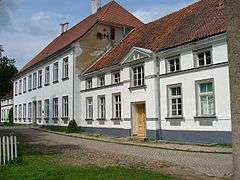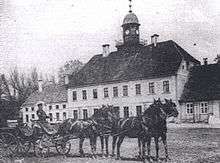Yasnaya Polyana, Kaliningrad Oblast

Yasnaya Polyana (Russian: Я́сная Поля́на; German: Trakehnen, from 1929 Groß Trakehnen; Lithuanian: Trakėnai; Polish: Trakany) is a rural settlement (posyolok) in the Nesterovsky District of Kaliningrad Oblast, Russia. It is located in the southeast of the oblast, north of the Romincka Forest. Nearby Diwnoje Nowoje is a railway station on the former Prussian Eastern Railway from Kaliningrad to Kybartai in Lithuania.
The settlement was originally known as the village of Trakehnen in East Prussia, named after the Old Prussian word trakis, meaning "great bog". In 1731 King Frederick William I of Prussia had the swampy territory of the Pissa River drained to establish the famous warmblood Trakehner horse breed stable (Königliches Stutamt Trakehnen) northwest of the municipality. The area was colonized by Protestant expellees from the Archbishopric of Salzburg.

Intended for the build-up of an own breeding supplying the Prussian Army cavalry, the stud farm at the time of its opening in 1732 had about 1,100 horses standing on an area of 25 km2 (9.7 sq mi). The "Soldier King" however soon became dissatisfied with the poor efficiency of the stud farm and in 1739 granted it to his son, crown prince Frederick II of Prussia. Upon Frederick's death in 1786, it was taken over by the Prussian state and renamed Königlich Preußisches Hauptgestüt Trakehnen. In professional hands, the stud and the village of Trakehnen prospered from that time on.
The Trakehnen stud farm had to be evacuated after the Prussian defeat at the 1806 Battle of Jena-Auerstedt, when the French Grande Armée approached to meet the Russian forces at the Eylau. From 1911 on it was the site of an annual cross-country race, named in the memory of Colmar von der Goltz in 1931.
Until 1945 Trakehnen was part of the Stallupönen district in the East Prussian Regierungsbezirk Gumbinnen. After the Red Army had occupied East Prussia at the end of World War II and the province was divided between the Soviet Union and the Republic of Poland, the settlement was renamed from Trakehnen to Yasnaya Polyana ("clear glade"). Although the settlement received a new name, the Russian name has a similar reference to the land, as Polje means "field" or "glade". The land was off-limits to all people outside of the Soviet Union for fifty years and information about it was almost non-existent. After the fall of the Iron Curtain, a few ethnic Germans from Russia and Kazakhstan were resettled to Yasnaya Polyana.
It was not maintained as a stable, although the grounds do have a museum for the breed. Russian and German initiatives have brought Trakehner horses to nearby Pravdinsk and Mayovka.
Notable people
- Walther Funk (1890–1960), Nazi politician
- Heinz Ziegler (1894–1972), Wehrmacht general
See also
External links
- Pictures of the Trakehner stables
- Trakehners in former East Prussia
- History of the Trakehner horse breed
| Wikimedia Commons has media related to Yasnaya Polyana, Kaliningrad Oblast. |
Coordinates: 54°34′07″N 22°26′46″E / 54.56861°N 22.44611°E